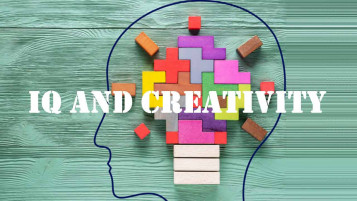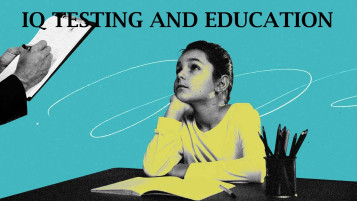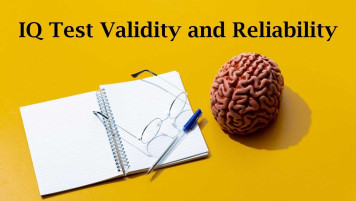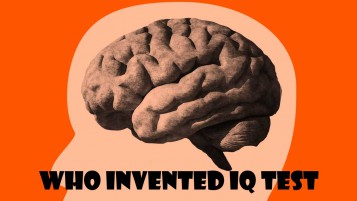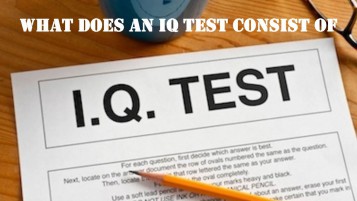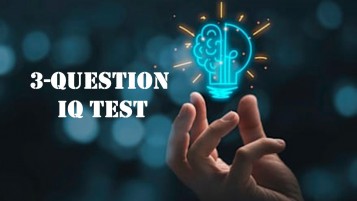When we talk about intelligence, most people immediately think of the intelligence quotient (IQ) – a score that measures reasoning, memory, and problem-solving skills. But over the last few decades, emotional intelligence, often called emotional quotient (EQ), has become just as important in conversations about personal and professional success (Goleman, 1995).
IQ can give you the mental tools to excel at technical or analytical work, while EQ helps you connect with people, manage emotions, and lead effectively. In today’s fast-changing workplace, balancing the two can make all the difference.
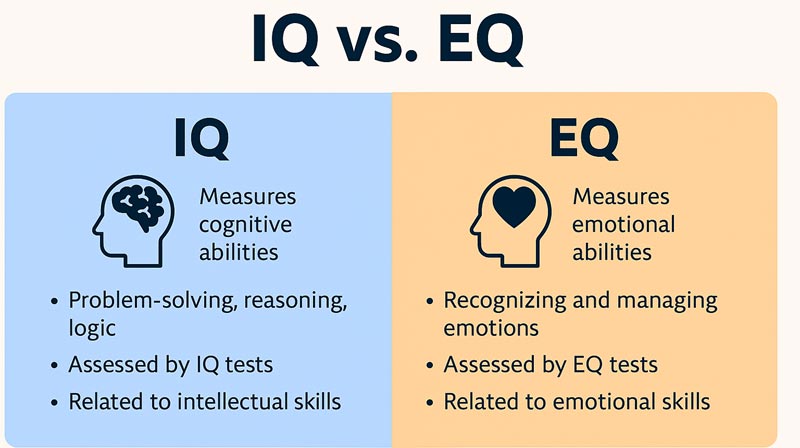
Infographic comparing IQ and EQ side by side, highlighting their key traits, skills, and assessment tools.
IQ is a numerical measure of cognitive ability, typically assessed through standardized tests like the Wechsler Adult Intelligence Scale (WAIS) or the Stanford-Binet Intelligence Scales (Neisser et al., 1996). These tests measure:
A high IQ can indicate strong learning potential, analytical thinking, and advanced technical skills. However, it doesn’t measure creativity, social skills, or emotional awareness.
EQ refers to your ability to recognize, understand, and manage your own emotions as well as the emotions of others (Salovey & Mayer, 1990). It includes:
In professional environments, high EQ is linked to better leadership, stronger teamwork, and improved adaptability to change (Mayer, Salovey, & Caruso, 2004).
|
Feature |
IQ |
EQ |
|
Primary Focus |
Cognitive and analytical skills |
Emotional and social skills |
|
Measures |
Problem-solving, reasoning, memory, verbal comprehension |
Self-awareness, empathy, emotional regulation, communication |
|
Workplace Strengths |
Technical performance, data analysis, innovation |
Leadership, teamwork, adaptability, conflict resolution |
|
Improvement Methods |
Education, puzzles, learning new skills |
Mindfulness, feedback, active listening, empathy training |
In modern workplaces, IQ helps you excel in tasks that require technical knowledge and critical thinking, while EQ enables you to build relationships, motivate teams, and navigate conflict (Côté & Miners, 2006).
Employees with strong IQ can develop innovative solutions, but without EQ, they may struggle to collaborate or lead. Likewise, high EQ without sufficient IQ might limit technical performance. The most successful professionals cultivate both.
IQ is assessed through standardized tests like the Wechsler Adult Intelligence Scale (WAIS) and the Stanford-Binet Intelligence Scales. These measure reasoning, memory, processing speed, and verbal comprehension. Tests are administered by trained psychologists in controlled environments to ensure fairness and accuracy, with scores compared against a same-age population. While useful for evaluating cognitive ability, IQ tests don’t measure creativity, emotional skills, or interpersonal abilities.
EQ is evaluated using tools that measure how you perceive, understand, and manage emotions. The Mayer-Salovey-Caruso Emotional Intelligence Test (MSCEIT) is a leading option, assessing skills like recognizing emotions, using emotions to enhance thinking, understanding emotional changes, and managing feelings effectively. Other methods include self-report surveys, 360-degree feedback, and situational judgment tests. EQ testing focuses less on right-or-wrong answers and more on how well you navigate emotional situations.
Contrary to the old belief that intelligence is fixed, research shows that both IQ and EQ can be strengthened over time with consistent effort and the right activities.
Improving IQ: Engage your brain in diverse, challenging ways. Reading a variety of topics, solving logic puzzles, learning new skills, and tackling mentally demanding tasks all stimulate cognitive growth and help build problem-solving ability (Benedek et al., 2014).
Improving EQ: Focus on understanding and managing emotions both your own and others’. Practicing mindfulness, reflecting on your emotional responses, seeking constructive feedback, and intentionally developing empathy can boost your emotional intelligence and improve relationships (Nelis et al., 2009).
With deliberate practice, you can nurture both your analytical abilities and your emotional skills, creating a balanced foundation for personal and professional success.
For employees – In most workplaces, EQ often has the edge when it comes to teamwork and adaptability. A high EQ helps you communicate effectively, navigate conflicts, and build strong relationships, while IQ ensures you can perform tasks efficiently and pick up new technical skills quickly.
For managers – Leadership demands a strong EQ to inspire, motivate, and guide teams through challenges. At the same time, IQ remains vital for analyzing complex problems, making strategic decisions, and driving innovation. The most effective leaders know how to blend the two — applying emotional intelligence to connect with people and cognitive intelligence to chart the right course.
In conclusion, IQ sharpens your thinking while EQ strengthens your connection with others. Both are essential for achieving career success and personal growth. By actively developing both, you can think strategically, lead compassionately, and adapt effectively in any situation.
References
